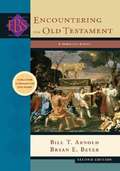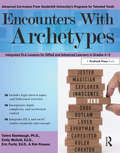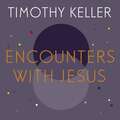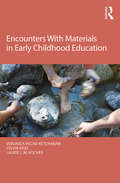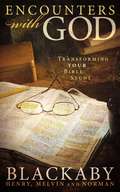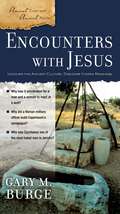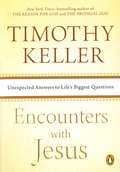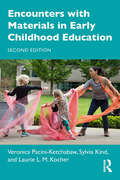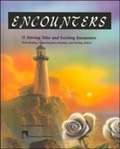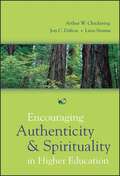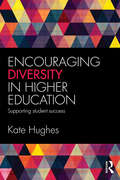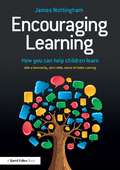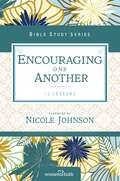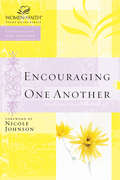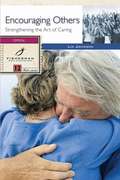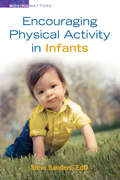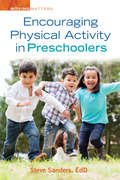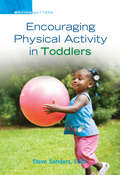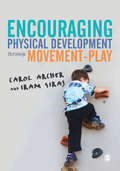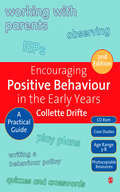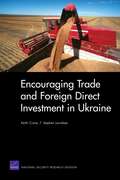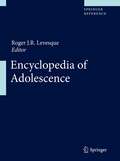- Table View
- List View
Encountering the Old Testament: A Christian Survey (2nd edition)
by Bill T. Arnold Bryan E. BeyerThe bestselling Encountering the Old Testament has become the leading Old Testament survey text. Now the second edition has been updated throughout with revisions to the text, sidebars, bibliographies, notes, and indexes. The book's numerous helpful features include sidebars, focus boxes, learning objectives, chapter outlines and summaries, and study questions.
Encounters With Archetypes: Integrated ELA Lessons for Gifted and Advanced Learners in Grades 4-5
by Tamra Stambaugh Emily Mofield Eric Fecht Kim KnaussEncounters With Archetypes integrates the study of archetypes with the concept of encounters. This unit, developed by Vanderbilt University's Programs for Talented Youth, is aligned to the Common Core State Standards and features accelerated content, creative products, differentiated tasks, engaging activities, and the use of in-depth analysis models to develop sophisticated skills in the language arts. Through the lens of encounter, students will examine the patterns, symbols, and motifs associated with common archetypes by analyzing fictional and informational texts, speeches, and visual media. Students will follow various archetype encounters with conflicts and challenges to explore questions such as “How do archetypes reflect the human experience?” and “How do archetypes reveal human strengths and weaknesses?" Ideal for gifted classrooms or gifted pull-out groups, the unit features texts from Sandra Cisneros, Louis Untermeyer, Rudyard Kipling, Emily Dickinson, and Maya Angelou; biographies of Oprah Winfrey, Mother Teresa, Jackie Robinson, Sally Ride, and Lin-Manuel Miranda; a speech from President Ronald Reagan; a novel study featuring Wonder by R. J. Palacio and/or Counting by 7s by Holly Goldberg Sloan; and art from Pieter Bruegel. Grades 4-5
Encounters With Jesus: Unexpected Answers to Life's Biggest Questions
by Timothy KellerWhat is my purpose in life? Who am I meant to be? How can I live a successful life? Why is there so much wrong with our world today? Am I part of the problem? What can I do to help change that? These are the big, seemingly unanswerable questions that everyone must ask and then answer in life. In Encounters With Jesus, New York Times-bestselling author and renowned pastor Timothy Keller explores Jesus' answers to life's biggest questions by showing what happened to those who met Jesus personally.Jesus changed the lives of nearly every person he met in the Gospels. These were powerful experiences that can have a profound effect on us today and help explain not only different aspects of Christianity, but the deep questions of life itself. Timothy Keller highlights ten of these encounters, including his meeting a sceptical student, a religious insider, an outcast, even Satan himself, and proves how invaluable the lessons from these encounters are for contemporary readers.(P)2013 Penguin Audio
Encounters With Materials in Early Childhood Education
by Veronica Pacini-Ketchabaw Sylvia Kind Laurie L. KocherEncounters with Materials in Early Childhood Education rearticulates understandings of materials—blocks of clay, sheets of paper, brushes and paints—to formulate what happens when we think with materials and apply them to early childhood development and classrooms. The book develops ways of thinking about materials that are more sustainable and insightful than what most children in the Western world experience today through capitalist narratives. Through a series of ethnographic events and engagement with existing ideas of relationality in the visual arts, feminist ethics, science studies, philosophy, and anthropology, Encounters with Materials in Early Childhood Education highlights how materials can be conceptualized as active participants in early childhood education and generators of human insight. A variety of examples show how educators, young children, and researchers have engaged in thinking with materials in early years classrooms and explore what materials are capable of in their encounters with other materials and with children. Please visit the companion website at www.encounterswithmaterials.com for additional features, including interviews with the authors and the teachers featured in the book, videos and photographs of the classroom narratives described in these pages, and an ongoing blog of the authors’ ethnographic notes.
Encounters With Materials in Early Childhood Education
by Veronica Pacini-Ketchabaw Sylvia Kind Laurie L. KocherEncounters with Materials in Early Childhood Education rearticulates understandings of materials—blocks of clay, sheets of paper, brushes and paints—to formulate what happens when we think with materials and apply them to early childhood development and classrooms. The book develops ways of thinking about materials that are more sustainable and insightful than what most children in the Western world experience today through capitalist narratives. Through a series of ethnographic events and engagement with existing ideas of relationality in the visual arts, feminist ethics, science studies, philosophy, and anthropology, Encounters with Materials in Early Childhood Education highlights how materials can be conceptualized as active participants in early childhood education and generators of human insight. A variety of examples show how educators, young children, and researchers have engaged in thinking with materials in early years classrooms and explore what materials are capable of in their encounters with other materials and with children.Please visit the companion website at www.encounterswithmaterials.com for additional features, including interviews with the authors and the teachers featured in the book, videos and photographs of the classroom narratives described in these pages, and an ongoing blog of the authors’ ethnographic notes.
Encounters with God: Transforming Your Bible Study (Encounters With God)
by Norman Blackaby Henry Blackaby Melvin BlackabyExperience God in a deeper way by developing how you read and study his Word. Renowned Bible teacher Henry Blackaby, and his sons Norman and Mel, believe that Bible study is far more than a study method—it's a way of life, a way of encountering our Creator and His voice in our lives. In this timeless classic of Bible study, the Blackabys will teach you how to read the Bible so that you receive the message, encounter truth, and become transformed by the Word.Studying the Bible is not just the pursuit of biblical and theological head knowledge. It is a journey for your soul into the heart of God. You'll discover:How to approach the Bible with a mindset of worship.How your encounters with Scripture can change your everyday life.How to study effectively on your own by walking through short passages from the seven types of literature in the Bible.How reading Scripture conforms you to the image of God. How to write His words on your heart so that you more fully hear His voice and walk in His ways all the days of your life. Encounter God is an invitation to approach God through His Living Word. Encounter God and make life changes because of it. Not just head knowledge, but heart change.Get ready for a brand new experience with your Bible.
Encounters with Jesus (Ancient Context, Ancient Faith)
by Gary M. BurgeChristian readers of the New Testament study the great stories about Jesus through the lens of western culture. In this series of books, Gary Burge uses his extensive knowledge of the first century world and the Middle East to offer insights not available to the average person. Each book will develop important cultural themes and wrap them around well-known New Testament passages. And the result will be insights rarely gained elsewhere. See Jesus through the eyes of two men and three women. Each character in the story—a tax collector, a Phoenician woman, a centurion, etc.—brings along elements from their own world now hidden from us because we do not share the culture of Jesus' world. Insights from the first century Middle East abound to unlock profound insights about Jesus and his audience.
Encounters with Jesus: Unexpected Answers to Life's Biggest Questions
by Timothy KellerNew York Times bestselling author of The Songs of Jesus Timothy Keller explores how people are changed by meeting Jesus personally--and how we can be changed encountering him today.The people who met Jesus Christ in person faced the same big life questions we face today. Like most of us, the answers handed down to them didn't seem to work in the real world. But when they met Jesus, things started to change immediately for them. It seems he not only had the answers -- he was the answer. In Encounters with Jesus, Timothy Keller shows how the central events and meetings in Jesus' life can change our own lives forever.From the Trade Paperback edition.
Encounters with Materials in Early Childhood Education
by Veronica Pacini-Ketchabaw Sylvia Kind Laurie L. KocherThis text rearticulates understandings of materials—blocks of clay, sheets of paper, brushes and paints, fabrics, and plastics—to formulate new ideas about what happens when we think with materials and apply them to early childhood development and classrooms.Through a series of ethnographic examples and engagement with existing ideas of relationality in the visual arts, feminist ethics, science studies, philosophy, anthropology, and environmental humanities, Encounters with Materials in Early Childhood Education highlights how materials can be conceptualized as active participants in early childhood education. Updated to include choreographies with fabrics and the process of reparation with plastics, this second edition shows how educators, young children, and researchers have explored what materials are capable of in their encounters with other materials and with children.The book is key reading for undergraduate students, graduate students, and pre-service teachers in early childhood education and art education programs. Access the Instructor and Student Resources at www.encounterswithmaterials.com.
Encounters: 15 Stirring Tales and Exciting Encounters
by Burton GoodmanThis book contains 15 outstanding stories, each of recognized literary value. Within these pages you will find time-honored authors, as well as present-day writers. You will find, too, that many countries and cultures are represented. As the title suggests, each selection in this volume involves an encounter. There are, of course, many different kinds of encounters. As you might expect, there are encounters with enemies and danger. But characters also look within themselves, as they encounter questions dealing with personal courage and conscience.
Encouraging Authenticity and Spirituality in Higher Education
by Liesa Stamm Jon C. Dalton Arthur W. ChickeringThis groundbreaking book provides a comprehensive resource that addresses the growing movement for incorporating spirituality as an important aspect of the meaning and purpose of higher education. Written by Arthur W. Chickering, Jon C. Dalton, and Leisa Stamm--experts in the field of educational leadership and policy--"Encouraging Authenticity and Spirituality in Higher Education" shows how to encourage increased authenticity and spiritual growth among students and education professionals by offering alternative ways of knowing, being, and doing. "Encouraging Authenticity and Spirituality in Higher Education" includes a rich array of examples to guide the integration of authenticity and spirituality in curriculum, student affairs, community partnerships, assessment, and policy issues. Many of these illustrative examples represent specific policies and programs that have successfully been put in place at diverse institutions across the country. In addition, the authors cover the theoretical, historical, and social perspectives on religion and higher education and examine the implications for practice. They include the results of recent court cases that deal with church-state issues and offer recommendations that pose no legal barrier to implementation.
Encouraging Diversity in Higher Education: Supporting student success
by Kate HughesEncouraging Diversity in Higher Education: Supporting Student Success provides an overview of the widening participation movement in Higher Education in the United Kingdom, United States, Australia and New Zealand. It argues that universities should revitalise their learning and teaching practices to better meet the diverse learning needs of contemporary undergraduate students. Approachable in execution, this book provides an evidence-based set of classroom practices, which readers will readily be able to relate to and use successfully. Answering questions such as: • How can I enrich my undergraduate teaching? • How can I help undergraduate students engage fully with their learning? • How can help undergraduate students to quickly acclimatise to Higher Education? • How can I help undergraduate students from diverse backgrounds excel at university? This book discusses economic and discursive drivers used to increase the numbers of undergraduate students who were the first in their families to enter university, and some of the ways in which universities responded to the growing percentage of such students. In so doing, it considers the learning needs of diverse students, and discusses the views of academic teaching staff who have used transparent pedagogies in their classrooms. Including forty five teaching strategies designed to generate highly engaged, socially inclusive classrooms, this is the first book to offer both a theoretical background of the need to approach learning and teaching in contemporary universities in innovative ways, and a practical, step by step guide to using a suite of transparent pedagogies. These focus on building inclusive classroom communities, generating academic literacies, developing collaborative learning skills, and encouraging students to think critically. This book will be a useful companion for both early career academics and those with experience but dealing with a new student cohort. It will also be of great interest to those teaching or studying the many professional qualifications in tertiary education. Kate Hughes is the President of the Australian Sociological Association (TASA) and Senior Consultant of Teaching and Learning at the Australian Catholic University. She is the co-author of Australian Sociology: A Changing Society, the market leading undergraduate text in Australia, now in its fourth edition.
Encouraging Learning: How you can help children learn
by James Nottingham‘I recommend this book to anyone wishing to help children learn. In it you will find some lovely ideas for improving the way we encourage, support and praise all young people.’ Professor Carol Dweck, author of Mindset, Stanford University, USA ‘James has developed a rare skill for blending arresting anecdotes, hard-edged research and practical advice into a truly compelling narrative.’ Professor Barry Hymer, author of the Gifted and Talented Pocket Book, Cumbria University, UK Over the last 20 years James Nottingham has studied how children learn. He has taught every age group in both primary and secondary schools, helped deaf teenagers deal with anger and isolation and even done philosophy with three-year-olds. In this inspiring, humorous, and practical book he shows what you can do to help children of all ages develop into confident, thoughtful and independent learners. Based around the acronym ASK, this book explores attitudes, skills and knowledge to learning – what is required and how to develop these skills more effectively. It shows how to encourage independent thinking and a spirit of inquiry in your children. Highlights include: the dangers of calling our children clever, bright and gifted; the best ways to teach wisdom; how to help children excel in exams; why curiosity did not kill the cat. With a foreword written by John Hattie, Encouraging Learning draws on research from some of the most respected experts on thinking and learning to identify the best ways to help children learn more effectively, efficiently and co-operatively. For everyone living or working with children – particularly teachers, parents, carers and youth workers - this book shows you some of the best ways to enhance children’s learning, including how to question, praise, and encourage more effectively.
Encouraging One Another (Women of Faith Study Guide Series)
by Thomas Nelson Nichole JohnsonSometimes we plod through life with our head down. Day in and day out we push along, putting our shoulders into it, and keeping a stiff upper lip. What we really need is a little encouragement to get through the day. We just need some kind words from others to let us know that what we are doing really matters. In Encouraging One Another, you will explore what Scripture has to say about the value God places on your life and how He notices all that you are doing. You will read passages that will lift your spirit as you hear God speaking His words of encouragement into your life. You will also discover that just as God lifts you up, He wants you to lift up others. The Women of Faith® Bible Studies provide intriguing insights into topics that are relevant to women's lives today. Each guide includes twelve weeks of study, down-to-earth illustrations, and reflections to help you move the truth from your head to your heart. A leader's guide for use with small groups is also included.
Encouraging One Another (Women of Faith Study Guide Series)
by Thomas NelsonFilling the needs of today's women, we offer the next 4 titles in the best-selling Women of Faith series.These topical guides deal with issues that women wrestle with today, such as friendship, encouragement, managing moods, finding contentment, and how to live out your faith. Reaching an audience across racial, socio-economic, denominational, and age boundaries, these guides will enhance the lives of women as they empower them in their weekly devotions. The study guides can be used for both individual and group settings. Women are asking good questions about their faith. With our study guides, we want to join them in their quest for knowledge and lead them in finding the answers they are seeking. The Study Guide Series will include the following:#5 Managing Your Moods - Foreword by Marilyn Meberg ISBN: 0-7852-5151-0#6 Cultivating Contentment - Foreword by Luci Swindoll ISBN: 0-7852-5152-9#7 Encouraging One Another - Foreword by Nicole Johnson ISBN: 0-7852-5153-7#8 A Life of Worship - Foreword by Sheila Walsh ISBN: 0-7852-5154-5
Encouraging Others: Strengthening the Art of Caring (Fisherman Bible Studyguide Series)
by Lin JohnsonBuild Others Up!As God's people live out their faith in this world, they need advice, challenge, and encouragement to persevere. Sometimes we need a reminder that we can be "spiritual cheerleaders" for other believers. These studies give models from Scripture for encouraging others and building them up in their faith, showing that as we support others, the blessing of encouragement comes back to us.From the Trade Paperback edition.
Encouraging Physical Activity in Infants
by Steve SandersBabies are naturally active, and their movements help them explore their environment. They first move involuntarily, based on reflexes, and then learn to move more independently as their bodies grow stronger and they begin to investigate the world around them. You can encourage their muscle development, strength and balance with simple activities done with infants as young as six weeks old. The first year of life lays the foundation for further development of gross motor skills as a toddler and preschooler. So get those little bodies moving!
Encouraging Physical Activity in Preschoolers
by Steve SandersPreschoolers are constantly using their bodies to play and learn, whether you encourage activity or not. You can help them stay active as they grow by providing instruction in physical skills, motivating them to develop strength and fluid movements, and challenging them to improve their skill levels. Not every child will become an athlete, but all children use motor skills to move around their environment, interact with others, play games, and learn.Your guidance can mean the difference between playing confidently and giving up in embarrassment. As in all types of learning, practice helps solidify the lessons learned during physical movement instruction. Motivated by the knowledge and experience you provide, the preschoolers in your care can grow strong bodies, enjoy physical activity, and move with assurance toward a healthy lifestyle.
Encouraging Physical Activity in Toddlers
by Steve SandersToddlers are on the move almost constantly! Even though encouraging physical activity is not a problem, you can model new movements and skills and lay the foundation for them to enjoy physical activity as they grow. Toddlers need lots of time to master the basics, such as jumping, rolling, and balancing. As they become more comfortable with their bodies and confident in their ability to be physically active, their desire to participate will increase. They’ll enjoy kicking and throwing different types of balls, walking up and down stairs, running outside, and pedaling tricycles. Most of their physical activity involves unstructured play, and rightly so. However, you can also introduce them to new equipment with structured play and then let them explore on their own or with playmates. If you help toddlers understand how to develop physical skills, you will help them build confidence and have fun being active. What a gift for a lifetime!
Encouraging Physical Development Through Movement-Play
by Professor Iram Siraj Carol ArcherMovement-play, put simply, is encouraging physical activity in a child-led manner for the benefit of children's health, learning and wellbeing. This book looks at the theory behind the importance of movement and: how movement play links with all the areas of early childhood development physical activity guidelines for young children practical advice and photos to support implementation in settings how to assess your own setting how to best work with parents on this topic comprehensive guidance on writing a physical development policy The early years is one of the critical periods in the establishment of physical behaviours and physical development is also one of the prime areas of the EYFS as well as other, global, curricula. A must-read for students on Early Childhood and Early Years courses and Early Years practitioners to improve their practice and understanding of psychical development for the benefit of young children.
Encouraging Physical Development Through Movement-Play
by Professor Iram Siraj Carol ArcherMovement-play, put simply, is encouraging physical activity in a child-led manner for the benefit of children's health, learning and wellbeing. This book looks at the theory behind the importance of movement and: how movement play links with all the areas of early childhood development physical activity guidelines for young children practical advice and photos to support implementation in settings how to assess your own setting how to best work with parents on this topic comprehensive guidance on writing a physical development policy The early years is one of the critical periods in the establishment of physical behaviours and physical development is also one of the prime areas of the EYFS as well as other, global, curricula. A must-read for students on Early Childhood and Early Years courses and Early Years practitioners to improve their practice and understanding of psychical development for the benefit of young children.
Encouraging Positive Behaviour in the Early Years: A Practical Guide
by Ms Collette DrifteIncludes CD-Rom 'The book successfully bridges the gap between theory and practice, presenting essential background information and knowledge in an easy to understand way' - Early Years Update 'The whole book would be useful as a refresher course to enable practitioners who do not come across significant behaviour problems on a regular basis in the course of their work. It is a well resourced book that will also assist newly qualified practitioners/Special Educational Needs Co-ordinators to undertake and understand the importance of IEP/Behaviour plans and issues' - Early Years Online 'As Early Years settings now include more children with difficult behaviour, this publication is to be welcomed. It will be invaluable in supporting professionals to manage all young children who display difficult behaivour and in particular, those with special educational needs. The author provides some really useful suggestions, practical strategies and case studies on encouraging positive behaviour in a clear, easy to follow format. The resources on the accompanying CD-Rom will be useful in supporting settings to develop policies and practice and in the training and development of staff' - Jan Morrison, Independent Consultant and Trainer This exciting new edition of a much-loved book offers the reader the following new elements: - a CD-Rom with lots of downloadable resources including self-audits for settings, letters to parents, Individual Education Plans (IEPs), Play Plans, quizzes and crosswords - coverage of new legislation and initiatives, such as the Early Years Foundation Stage and Every Child Matters - new case studies - guidance on how to plan, write and review Play Plans, with examples provided Covering the 3 to 8 age range, this book is full of practical strategies, good advice and clear and helpful suggestions. It will help you encourage good behaviour from every child in your setting, and is particularly strong on suggesting ways to support children with special educational needs. Collette Drifte is a Freelance Writer and Educational Consultant based in Northumberland; she worked previously as a teacher and Deputy Head for many years.
Encouraging Trade and Foreign Direct Investment in Ukraine
by Keith Crane F. Stephen LarrabeeReports on a study whose goal was to analyze Ukraine's environment for foreign trade and FDI and to develop policy proposals to expand Ukraine's foreign trade and attract more FDI, especially vis-Ã -vis the United States. Barriers to trade and FDI, the chief one being corruption, are described, and a two-pronged strategy for removing the worst barriers is recommended-one prong to bring immediate results; the other to set in motion changes requiring more time.
Encyclopaedism from Antiquity to the Renaissance
by Jason König Greg WoolfThere is a rich body of encyclopaedic writing which survives from the two millennia before the Enlightenment. This book sheds new light on that material. It traces the development of traditions of knowledge ordering which stretched back to Pliny and Varro and others in the classical world. It works with a broad concept of encyclopaedism, resisting the idea that there was any clear pre-modern genre of the 'encyclopaedia', and showing instead how the rhetoric and techniques of comprehensive compilation left their mark on a surprising range of texts. In the process it draws attention to both remarkable similarities and striking differences between conventions of encyclopaedic compilation in different periods, with a focus primarily on European/Mediterranean culture. The book covers classical, medieval (including Byzantine and Arabic) and Renaissance culture in turn, and combines chapters which survey whole periods with others focused closely on individual texts as case studies.
Encyclopedia of Adolescence
by Roger J.R. LevesqueThe Encyclopedia of Adolescence breaks new ground as an important central resource for the study of adolescence. Comprehensive in breath and textbook in depth, the Encyclopedia of Adolescence - with entries presented in easy-to-access A to Z format - serves as a reference repository of knowledge in the field as well as a frequently updated conduit of new knowledge long before such information trickles down from research to standard textbooks. By making full use of Springer's print and online flexibility, the Encyclopedia is at the forefront of efforts to advance the field by pushing and creating new boundaries and areas of study that further our understanding of adolescents and their place in society. Substantively, the Encyclopedia draws from four major areas of research relating to adolescence. The first broad area includes research relating to "Self, Identity and Development in Adolescence". This area covers research relating to identity, from early adolescence through emerging adulthood; basic aspects of development (e.g., biological, cognitive, social); and foundational developmental theories. In addition, this area focuses on various types of identity: gender, sexual, civic, moral, political, racial, spiritual, religious, and so forth. The second broad area centers on "Adolescents' Social and Personal Relationships". This area of research examines the nature and influence of a variety of important relationships, including family, peer, friends, sexual and romantic as well as significant nonparental adults. The third area examines "Adolescents in Social Institutions". This area of research centers on the influence and nature of important institutions that serve as the socializing contexts for adolescents. These major institutions include schools, religious groups, justice systems, medical fields, cultural contexts, media, legal systems, economic structures, and youth organizations. "Adolescent Mental Health" constitutes the last major area of research. This broad area of research focuses on the wide variety of human thoughts, actions, and behaviors relating to mental health, from psychopathology to thriving. Major topic examples include deviance, violence, crime, pathology (DSM), normalcy, risk, victimization, disabilities, flow, and positive youth development.
